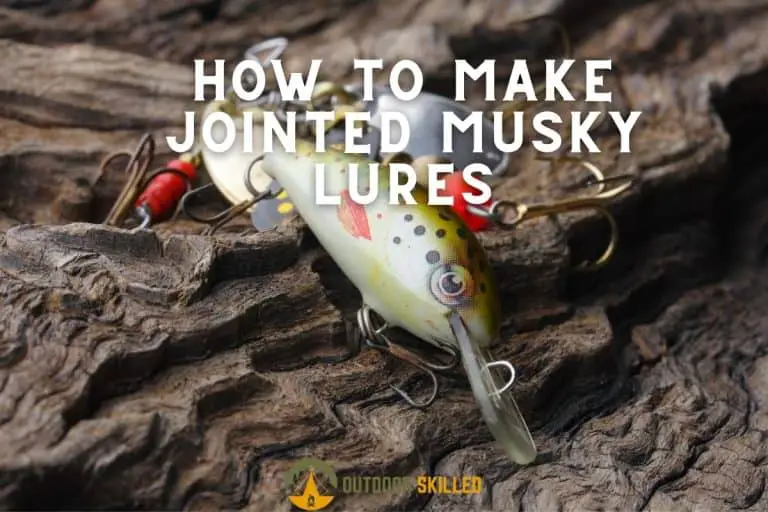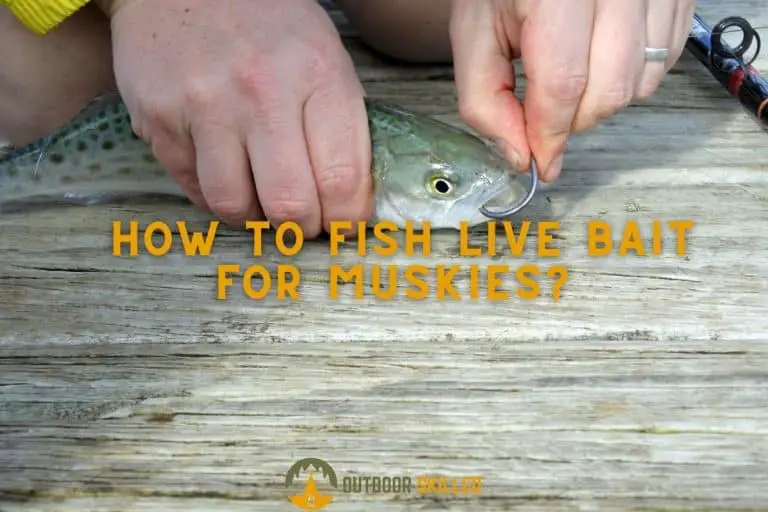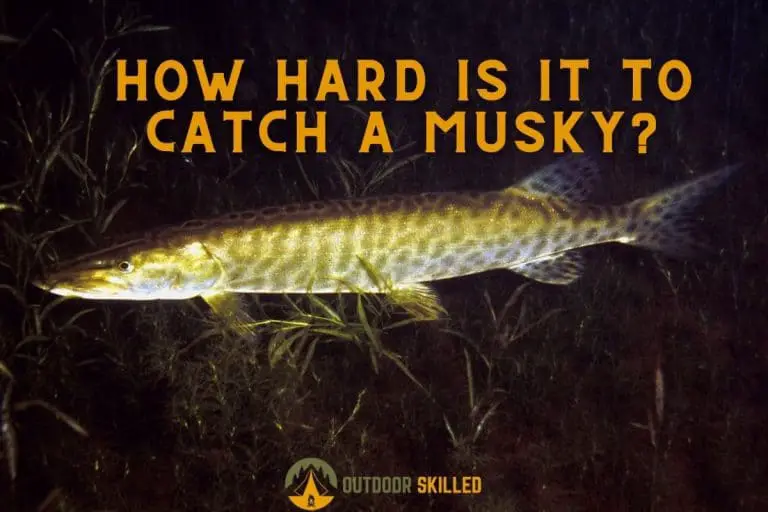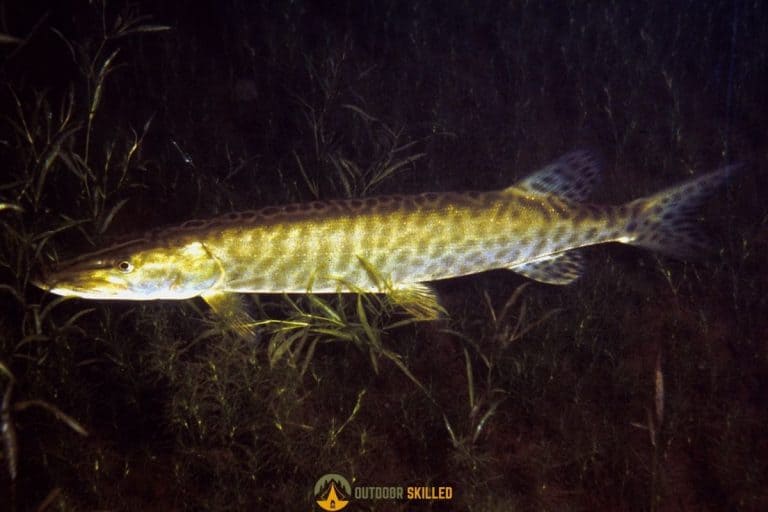Why Do Muskies Porpoise? 3 Reasons Explained
Porpoising is a phenomenon where fish swim close to the surface of the water and stick their heads out. It’s very common among many fish species, including muskies and it can be very exciting to witness. However, many anglers often wonder what exactly is the reason behind it.
So, why do muskies porpoise? Muskies porpoise for several reasons. They might swim with their head out of the water to clean their gills and to reduce the swelling in their swim bladders. They might also do it to get more air if the oxygen levels in the water are low.
Keep reading to learn more about the reasons why muskies porpoise and how to catch muskies if they swim close to the surface of the water.
Table of Contents
What Does It Mean for Muskies to Porpoise?

Muskies often swim with their heads out of the water and this is often referred to as “porpoising” or “basking”. The term “porpoising” comes from the porpoise species which is known for surfacing on the water in a way that’s similar to dolphins.
While it may seem strange, it’s a very common occurrence with various fish species and scientists were able to explain the reasons behind it.
The main reason why muskies porpoise is to clean their gills.
When muskies feed at the bottom of the water they often consume harmful substances such as dirt, debris, or even parasites along with their food. These particles tend to get stuck in their gills, so porpoising can effectively clear them out so that muskies can breathe better.
Another common reason why muskies porpoise is to stabilize their swim bladders.
When muskies move from a deep area in the water to a shallow area, their bladders will start swelling which can be very uncomfortable and can hinder their ability to swim or breathe properly.
So, by getting their bodies out of the water for a brief, they can force the air out of their bladder through their esophagus which will reduce the swelling and stabilize the bladder. This will allow them to swim comfortably at different depths as they re-enter the water.
Muskies also porpoise to seek more oxygen if the oxygen levels in their environment become too low, however, this rarely happens.
Will Muskies Jump When They’re Near the Surface?

Muskies will jump out of the water when they’re near the surface for the same reasons mentioned before.
They might jump to clean their gills from any stuck dirt, debris, or parasite. They might also jump to stabilize their swim bladders by forcing the air out of their swim bladders and reducing their swelling. Both of these reasons allow the muskies to swim and breathe more comfortably when they re-enter the water.
Sometimes, muskies will jump out of the water if they’re in the middle of spawning.
During their spawning season, muskies tend to move to shallow waters and male muskies will start jumping out of the water when they get restless while female muskies will start jumping to loosen their eggs.
Muskies are usually not interested in feeding or biting during these periods as they focus all of their energy on the spawning process.
Do Musky Fish Bite When They’re Porpoising?
Muskies will bite when they’re porpoising if they’re presented with lures or baits they find appealing. The lures and baits also have to be presented at a suitable depth, so if you cast them too deep into the water, they might not bite. You can check out the best lures for Muskies here.
Keep in mind that muskies will not bite on anything you present during their spawning season because they will not be interested in feeding at all.
That’s why it’s usually recommended that anglers respect the muskies’ nature and allow them to complete the spawning process until they’re ready to start feeding again.
Once the muskies finish the spawning price, they will go on a post-spawn feeding spree to replenish their energy, then they will bite on any lure or bait and it will be a lot easier for anglers to catch them close to the surface.
How to Catch Muskies Near the Surface of the Water?
Muskies become more cautious when they swim near the surface and they will take some time to investigate the lures and baits presented to them before they bite.
In order to successfully catch muskies near the surface of the water, you need to know where exactly to target them and the best times to target them. You also need to adjust your fishing technique to suit surface fishing and be prepared with the right kind of gear.
Now, let’s break down all of these points in more detail.
Where to Target Muskies?
Muskies prefer clear waters. During springtime, they will move to shallow waters such as bays, creek mouths, and channels. You can find them lurking along weed edges, rock outcrops, or other structures.
I have made a guide on fishing for Muskies in creeks here, so make sure to check it out. I also have another guide to catching Muskies in the alum creek here since I used to fish there all the time.
When Is the Best Time to Target Muskies?
The best time to target muskies is around dawn and dusk when the temperature is not too cold or too warm. During these times, muskies will be more active and more likely to bite.
You can still catch Muskies at night, and I have a guide for nighttime Muskie fishing here that you should check out.
What’s the Best Technique to Catch Muskies Near the Surface?
The best technique to catch muskies near the surface is to cast large lures and drift the bait along the areas where they reside. This technique will allow you to cover more distance in less time and it’s less likely to scare the muskies away.
It’s recommended to cast from a distance that’s far enough so muskies wouldn’t detect your presence but close enough so you would be able to cast more accurately. It’s also recommended to avoid making loud noises or sudden movements.
What Kind of Gear is Best When Surface Fishing for Muskies?
It’s recommended to use long and stiff fishing rods. You can go for an 8-9 feet rod with medium-heavy power and fast action paired with a bait-casting reel. You can find the best baitcasting reels for under $100 here.
For the fishing line, it’s best to use a strong line that can withstand the heavyweight of musky fish. You can for a braided line with a 50 to 80-pound test.
It’s also highly recommended to attach about 1-2 feet of fluorocarbon leader between your mainline and your lure or bait. That is because muskies have razor-sharp teeth, so a leader will prevent them from biting through your mainline
Related Questions
What Are the Main Types of Musky Fish?
There are two main types of Musky fish which are Pure Muskies and Tiger Muskies. Pure muskies are silver, brown, or green in color and they have dark vertical stripes or spots on the side of their body. Meanwhile, tiger muskies are a hybrid of northern pike and musky fish. This type of musky does not grow as large as pure muskies but it grows a lot faster.
When Is the Musky Spawning Season?
The Musky spawning season starts by early spring and it can last from five to ten days. Spawning occurs mainly during the night and during this time, muskies will not feed or bite on anything. They will lay their eggs in areas with vegetation or structure at the bottom of the water.
Do Muskies Swim in Schools?
Muskies do swim in schools in certain territories. They are gregarious species which means they are able to associate in social groups and form cooperative societies. Muskies will gather in small schools and continually patrol their territory searching for available food when the water conditions and temperature are suitable.
Where to Find Muskies in Deep Waters?
Muskies will move to deep water during the summer when the temperature gets too hot at the surface. You can find them in areas with structure such as weed lines, drop-offs, and mid lake humps. You can also find them near rock piles searching for food.
Helpful Resources
Hunting Musky with a Fly – A Book by Rick Kustich
How to handle a Tiger Muskie safely
How to Catch a Muskie in the spring
Reliable Rods You Will Love (and Can Afford)
- Fishing for Bass? Check out these very sturdy Bass Fishing Rods
- Ice Fishing? These Ice Fishing Rods Will Never Let your down
- Get the best Trout Fishing Rods here, and the best Catfish rods here
- No rods give you a better value for your money than these Saltwater fishing rods
- Get the best Telescoping fishing rods here, the best Baitcasting rods here, and check out these superb Kayak fishing rods here.
- Fishing the Flow: Expert Picks for the 15 Best River Fishing Rods
If you like this article, please share it or pin it, you can find the share buttons below. We will really appreciate it ❤️







